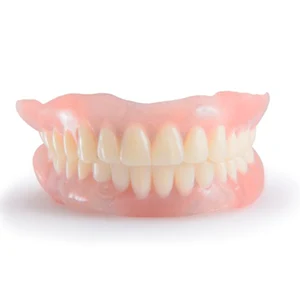Tooth loss—whether due to injury, decay, or aging—can impact everything from chewing and speech to self-confidence. Dentures are one of the most time-tested and effective solutions. But what are dentures and how do they work?
At Center For Dental Implants, our specialists have helped hundreds of patients restore function and aesthetics through high-quality denture care. This blog outlines the essentials—backed by clinical experience and research—to help you make informed decisions about your oral health.
What Are Dentures?
Dentures are removable prosthetic appliances custom-made to replace missing teeth and surrounding tissues. Crafted using durable materials like acrylic resin, porcelain, or flexible polymers, dentures restore the ability to eat, speak, and smile with ease.
According to the American College of Prosthodontists, around 36 million Americans have no natural teeth, and 90% of them wear dentures.
Dentures are not just cosmetic—they support the facial structure, reduce jawbone deterioration, and enhance daily function.
Types of Dentures: Tailored to Patient Needs
1. Complete (Full) Dentures
These are used when all teeth are missing in either the upper or lower arch. They rest on the gums and are held in place via suction or denture adhesive.
Common Candidates:
- Older adults with total tooth loss
- Patients with advanced periodontal disease
2. Partial Dentures
Partial dentures are used when some natural teeth remain. They consist of artificial teeth attached to a gum-colored base and are typically held in place with metal clasps or precision attachments.
Common Candidates:
- Patients with several missing teeth in one arch
- Those looking to avoid fixed bridges
3. Implant-Supported Dentures
These are anchored to titanium dental implants surgically placed in the jaw. They offer superior stability, chewing strength, and comfort.
According to a 2023 review in The Journal of Prosthetic Dentistry, implant-supported dentures reduce bone loss and improve long-term oral health outcomes.
4. Immediate Dentures
These are pre-made and placed immediately after tooth extraction. They are often used as temporary solutions while permanent dentures are being fabricated.
How Do Dentures Work?
Dentures function by replacing the natural anatomy of missing teeth and gums.
- Precise Impressions: Detailed impressions of your gums and any remaining teeth are taken to ensure the dentures conform precisely to your oral anatomy for a secure and comfortable fit.
- Customized Fabrication: Your dentures are crafted from biocompatible materials like acrylic or porcelain and shaped to match your jaw, bite, and facial structure for natural appearance and function.
- Retention Mechanism
- Full dentures rely on suction or adhesives.
- Partial dentures attach to adjacent natural teeth.
- Implant dentures lock onto titanium posts for unmatched stability.
- Speech & Chewing: Well-fitted dentures restore speech clarity by maintaining tongue and lip position, and allow for effective chewing by recreating a proper bite and jaw alignment.
The Denture Process at Center For Dental Implants
Initial Consultation
During your first visit, our dental team performs a thorough examination using digital X-rays and 3D imaging. We assess your oral health, discuss your concerns, and recommend the most suitable denture solution based on clinical findings.
Impressions & Bite Registration
We take accurate impressions of your upper and lower arches along with bite registration. This ensures your custom denture will align correctly, function comfortably, and match the unique anatomy of your jaw and soft tissues.
Wax Try-In for Fit and Appearance
A trial denture made of wax is created for you to try. This step allows us to evaluate aesthetics, speech, and bite alignment before final fabrication, ensuring the final denture meets both functional and cosmetic expectations.
Final Denture Placement
Once the trial fit is approved, the final dentures are fabricated and placed. Our dentist checks retention, bite, and comfort, and makes minor chairside adjustments so the dentures feel natural and secure from day one.
Follow-Up and Adjustments
We schedule follow-up visits to monitor your adaptation, address sore spots, and make precision adjustments. Ongoing care ensures your dentures continue to fit well and support your oral health as your mouth naturally changes.
Caring for Your Dentures
Proper care not only extends the life of your dentures but also protects your overall oral health.
Daily Denture Care Tips:
- Brush and rinse after meals using a soft-bristled brush and mild denture cleaner.
- Soak overnight in water or non-abrasive cleansing solution.
- Avoid hot water which can warp the material.
- Visit your dentist every 6–12 months for professional cleanings and adjustments.
Common Myths and Realities
“Dentures are only for seniors.”
Reality: Dentures can benefit younger patients who’ve lost teeth due to accidents, infections, or medical conditions.
“They’re uncomfortable and unnatural.”
Reality: Modern materials and digital customization have made dentures more natural-looking and comfortable than ever.
Conclusion: Your Smile, Restored with Confidence
So, what are dentures and how do they work? Dentures are a versatile and effective option to replace missing teeth and restore oral functionality. With advancements in materials and technology, they are more comfortable, stable, and natural-looking than ever before.
At Center For Dental Implants, we specialize in personalized, clinically-proven denture solutions that help you eat, speak, and smile with confidence.
Book your consultation today and discover a better way to smile.
FAQs
How long do dentures typically last?
Most dentures last between 5 to 10 years with proper care and regular adjustments.
Are implant-supported dentures better?
Yes. They provide enhanced chewing ability, stability, and help prevent bone loss.
Can I sleep with my dentures in?
It’s advised to remove them at night to allow your gums to rest and to prevent infections.
How long does it take to adjust to dentures?
Most patients adapt within 2 to 4 weeks. Follow-up visits help ease the transition.
Bibliography & Sources
- https://www.ada.org/resources/research/science-and-research-institute/oral-health-topics/dentures
- https://www.gotoapro.org/dentures/
- https://my.clevelandclinic.org/health/treatments/10947-dentures
- https://www.mayoclinic.org
- https://www.nidcr.nih.gov/research/data-statistics/tooth-loss/seniors
- https://www.ncbi.nlm.nih.gov/pmc/articles/PMC2888873/


